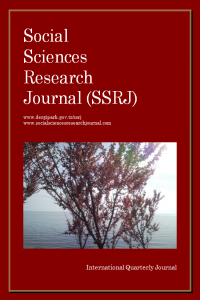Zeka İşgücü Verimliliğini Artırır mı? Kesit Veri Kanıtı
Zeka, Verimlilik, Yatay Kesit Veri, Tek Değişkenli Tahmin, Çok Değişkenli Tahmin
Does Intelligence Enhance Labor Productivity? Cross-Country Evidence
Intelligence, Productivity, Cross-Section Data, Univariate Estimation, Multivariate Estimation,
___
- Attanasio O., S. Cattan, E. Fitzsimons, C. Meghir, and M. Rubio-Codina. (2015). Estimating the Production Function for Human Capital: Results From a Randomized Control Trial in Colombia, Cowles Foundation Discussion Paper, No: 1987, Cowles Foundation for Research In Economics, Yale University, New Haven, Connecticut, 1-40.
- Brody , N. (1999). “What is intelligence ?” International Review of Psychiatry, 11(1), 19-25.
- Burhan, N.A.S., Mohamad, M.R., Kurniawan, Y., Sidek, A.H. (2014). “The Impact of Low, Average, and High IQ on Economic Growth and Technological Progress: Do All Individuals Contribute Equally?”, Intelligence, 46, 1-8.
- Christainsen, G.B. (2013). “IQ and The Wealth of Nations: How Much Reverse Causality?”, Intelligence, 41(5), 688-698.
- Ciccone, A. and Papaioannou, E. (2009). “Human Capital, The Structure Of Production, and Growth”, Review of Economics and Statistics, 91(1), 66–82.
- Dickerson, R.E. (2006). “Exponential Correlation of IQ and The Wealth Of Nations”, Intelligence, 34(3), 291-295.
- DiPietro, W. (2015). “National Wealth and National Intelligence as Determinants of National Productivity and National Innovation”, International Economics and Business, 1(1), 21-29.
- Hanushek, E. A. and Woessmann, L. (2012). “Do Better Schools Lead To More Growth? Cognitive Skills, Economic Outcomes, and Causation”, Journal of Economic Growth, 17(4), 267–321.
- Hibbs, D.A. and Olsson, O. (2004). “Geography, Biogeography, and Why Some Countries are Rich and Others are Poor”, Proceedings of the National Academy of Sciences -PNAS, 101(10), 3715-3720.
- Hunt, E. and Wittmann, W. (2008). “National Intelligence and National Prosperity”, Intelligence, 36, 1–9.
- Jamison, E. A., Jamison, D. T. and Hanushek, E. A. (2007). “The Effects of Education Quality on Income Growth and Mortality Decline”. Economics of Education Review, 26, 772–789.
- Jones, G., and W.J. Schneider. (2006). “Intelligence, Human Capital, and Economic Growth: A Bayesian Averaging of Classical Estimates (BACE) Approach”, Journal of Economic Growth, 11(1), 71–93.
- Jones, G. and W.J. Schneider. (2008). “IQ in the Production Function: Evidence from Immigrant Earnings”, Economic Inquiry, 48(3), 743-755.
- Jones, G. (2011a). “IQ and national productivity”, The New Palgrave Dictionary of Economics Online Edition, (Eds. Steven N. Durlauf and Lawrence E. Blume), Palgrave Macmillan, http://www.dictionaryofeconomics.com/article?id=pde2011_I000311,
- Jones, G. (2011b). “National IQ and National Productivity: The Hive Mind Across Asia”, Asian Development Review, 28(1), 51-71.
- Lynn, R. and Vanhanen, T. (2002). IQ and The Wealth of Nations, Westport-London: Praeger.
- Lynn, R. and Vanhanen, T. (2012a). “National IQs: A Review Of Their Educational, Cognitive, Economic, Political, Demographic, Sociological, Epidemiological, Geographic And Climatic Correlates, Intelligence”, Intelligence, 40(2), 226-234.
- Lynn, R., Vanhanen, T. (2012b). INTELLIGENCE: A Unifying Construct for the Social Sciences. Ulster Institute for Social Research, London.
- Meisenberg, G. (2011), “National IQ and Economic Outcomes”, Personality and Individual Differences, 53(2), 103–107.
- Meisenberg, G. and Lynn, R. (2011). “Intelligence: A Measure Of Human Capital in Nations”, Journal of Social, Political & Economic Studies, 36(4), 421–454.
- Meisenberg, G. (2014). “Cognitive Human Capital and Economic Growth in The 21st Century” In: T. Abrahams (ed), Economic Growth in the 21st Century: New Research, 49-106, New York: Nova Publishers.
- Nelson, R. R. and Phelps, E. (1966). “Investment in Humans, Technology Diffusion and Economic Growth”, American Economic Review, 56(2), 69-75.
- Nordhaus, W.D. (2006). “Geography and Macroeconomics: New Data and New Findings”, Proceedings of the National Academy of Sciences-PNAS, 103(10), 3510-3517.
- Ram, R. (2007). “IQ and Economic Growth: Further Augmentation of Mankiw-Romer-Weil Model”, Economics Letters, 94(1), 7-11.
- Romer, P. (1990). “Endogenous Technological Change”, Journal of Political Economy 98(5), Part 2: The Problem of Development: A Conference of The Institute for the Study of Free Enterprise Systems, (Oct.), S71–S102.
- Rindermann, H. (2008). “Relevance of Education and Intelligence at The National Level For The Economic Welfare of People” Intelligence, 36(2), 127–142.
- Rindermann, H., Sailer, S. and Thompson, J. (2009). “The Impact of Smart Fractions, Cognitive Ability of Politicians and Average Competence of Peoples on Social Development”, Talent Development & Excellence, 1(1), 3–25.
- Rindermann, H. and Thompson, J. (2011). “Cognitive Capitalism: The Effect of Cognitive Ability on Wealth, As Mediated Through Scientific Achievement and Economic Freedom”. Psychological Science, 22(6), 754–763.
- Yayın Aralığı: Yılda 4 Sayı
- Yayıncı: Denta Florya ADSM Limited Company
İçeriden Öğrenenler Ticaretine Yaklaşımlar
Zeka İşgücü Verimliliğini Artırır mı? Kesit Veri Kanıtı
İsmail Hakkı İŞCAN, Cuneyt KOYUNCU
Örgütsel Demokrasi ile Psikolojik Sermaye Arasındaki İlişki: Konaklama İşletmelerinde Bir Araştırma
Tahsin GEÇKİL, Nezahat KOÇYİĞİT
Asakir-i Mansure-i Muhammediye Ordusuna Asker Alımı (Hamid Sancağı ve Isparta Örneği)
İŞGÜCÜ PİYASASINDA GÜVENCELİ-ESNEKLİK MODELİ VE PİYASA ARAÇLARININ İSTİHDAMA ETKİLERİ
Seyhun DOĞAN, Mehmet Sencer GİRGİN
M.Ömer AZABAĞAOĞLU, Celal Demirkol
Küresel Kriz Sonrası Türkiye’de Uygulanan Ekonomi Politikaları
Bir Osmanlı Aydınının Düşünce Dünyası: Krikor Zohrab’la “Hayat, Olduğu Gibi”
Söylem, Temsil, Faillik ve Anlatı: Yeni Yoksulluk Literatürünün Bir Eleştirisi
